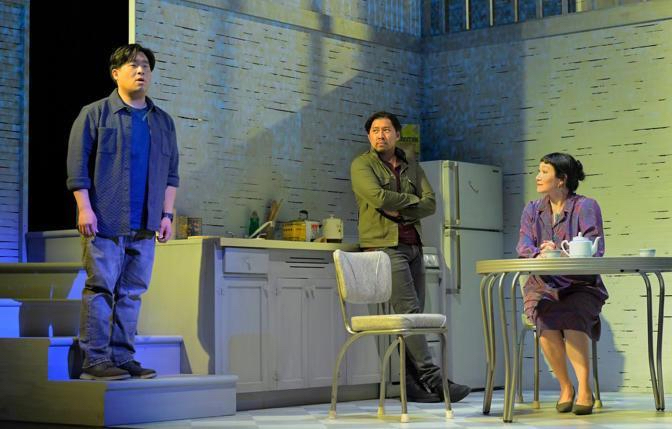
The stars of “The Headlands,” local playwright Christopher Chen’s San Francisco mystery, now playing at A.C.T.’s Toni Rembe Theatre, are the scenic and projection design by Alexander V. Nichols.
The play’s action centers on the Sunset district house where our Chinese-American amateur private eye narrator Henry (Phil Wong) grew up. Nichols’ putty gray streetfront exterior elegantly revolves on a turntable, revealing non-descript interior spaces: a kitchen, a staircase, a second floor picture window.
But every wall, inside and out, is brought to life with a shifting veil of video clips and still images, successfully evoking the shadowy, dangerous San Francisco of film noir as Henry begins delving into the fogbound facts of his father’s murder, more than twenty years earlier.
Between the motion of the set and the fluid rush of imagery, the stage becomes a dreamspace, a none-too-solid San Francisco.
While the geography of Marin plays a symbolic role in the plot, it is Henry’s headlands that the audience is drawn into. The walls between memory, speculation and the factual past dissolve. The projections are Henry’s as well.
This is gorgeous stuff: script and stagecraft in near-perfect harmony (Chen’s written stage directions deftly summarize the conceit that Nichols so handsomely executes). The first fifteen minutes dazzle.
All too soon though, Chen’s excess of exposition and director Pam MacKinnon’s languid pacing undermine the show’s conceptual brio. When the production’s initial flood of cinematic effects subsides, so does its narrative momentum.
Time passages
The brooding, existential aspects of the best film noir are, in part, conveyed by movies’ unique ability to fuse contemplative stillness with the relentless hurtle of time running out.
In “Dark Passage,” even as Humphrey Bogart’s character, Vincent Parry, stoically wrestles with inner demons amid subtle shifts of light and shadow, moviegoers remain forever conscious of a world that continues to rush forward at 24 frames per second. On stage, a frozen moment can last forever. And in “The Headlands,” it sometimes seems like they will.
In halting conversations between Henry and his girlfriend Jess (Sam Jackson, one of the Bay Area’s most charismatic actors, here a bit lost in an underwritten role) and in repeatedly remembered arguments between his parents, George (Johnny M. Wu) and Leena (Erin Mei-ling Stuart) there are pauses so long they feel anti-dramatic.
And there is no inherent urgency to Henry’s quest, no ticking clock to reel the narrative in. As the play opens, and recurrently throughout, Henry directly addresses the audience (a clumsy analog to noir’s narrative voiceovers). He’s a jovial, nerdy Google engineer whose father’s decades-past murder doesn’t seem to weigh heavily on him, having already made a hobby of investigating S.F.P.D. cold cases for quite some time before eventually getting around to Dad’s death.
Might Henry’s own story be a case of avoidance and repression? Neither Wong’s affable delivery or Chen’s opening monologue clue us in to such psychological underpinnings.
In fact, when Henry first explains that the victim of the murder he’s currently revisiting is his own father, opening night attendees expressed audible surprise.
What should be an ever-present emotional throughline of “The Headlands” is delivered as just one of several clever plot twists, with little lasting resonance.
The plot’s biggest wallop is a late-in-the-game reveal that, with its tale of bloodline surprises, obliquely links “The Headlands” to perhaps the greatest noir tribute film of all time: “Chinatown.” (I wouldn’t put such deviltry beyond Chen’s intention, despite the flaws of “The Headlands,” it’s still a heady piece of work, wickedly rich in allusion as well as delusion.)
Despite its title, that classic’s Oscar-winning Robert Towne screenplay had no substantial connection to Chinese-American culture, but Chen’s script draws deeply and insightfully on it, pointing to unexpressed emotions, intergenerational dynamics and secrets kept from children by parents.
“The Headlands” may not live up to Chen’s trickiest ambitions, but it’s an impressive work of intellectual legerdemain nonetheless. Hovering over an impossible intersection of cinematic and theatrical magic, it is sometimes foggy, but always intriguing.
